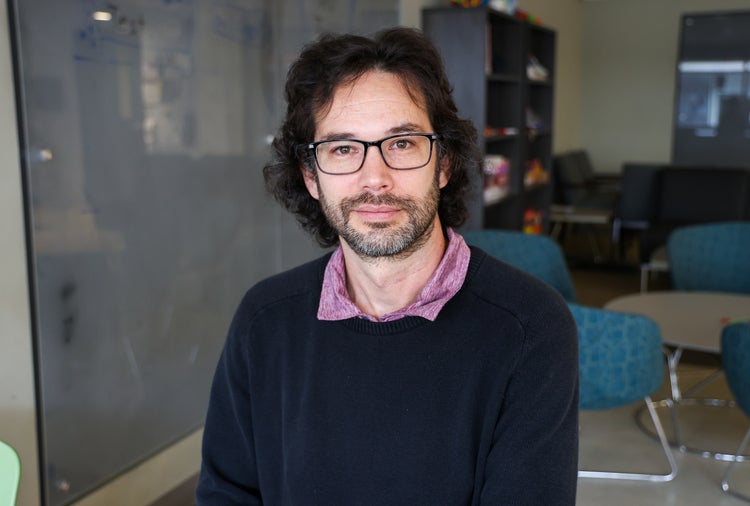Dr. Jesse Peterson is the newest member of the Department of Pure Mathematics, joining as a professor on June 2. A specialist in Operator Algebras, he joins the University of Waterloo after seventeen years at Vanderbilt University in Nashville, Tennessee.
He’ll also be representing the Faculty of Mathematics next year at the International Congress of Mathematicians (ICM), where he’ll have the privilege of speaking in the Analysis section.
We sat down to talk to him about his career, research, and why he’s excited to join the Faculty of Math.

How did you decide to become a mathematician?
I have enjoyed math ever since I was a kid – I was fascinated by the ideas. My journey to academia was very organic; I had some great professors in undergraduate at Westmont College who taught me the beauty that comes from proofs. I just fell in love. I followed that love to the next step, and the next step, and that led me to my career.
I went straight from undergraduate to a PhD at UCLA. When I started graduate school I had no idea what I wanted to specialize in, so I tried lots of different things. I remember I took a course in von Neumann algebras, and I thought the connections we made there were very beautiful. We had to do a project at the end of the semester, which involved reading papers and doing research.
At the end of the semester the professor asked me to look at this particular proof of a theorem in a paper from the seventies so we could discuss it at the beginning of the next term. I spent my entire summer – every day all day long – trying to understand this one proof! At the end of the summer I was really disappointed because I felt like I still didn’t understand it. I remember going to my professor’s office at the beginning of the school year, ready to concede defeat and ask for help. He had completely forgotten he had asked me to look at it!
Of course, it was extremely beneficial for me to do that work, and I really fell in love with von Neumann algebras that summer. So that led me to my specialization, and in the future I did actually work with that professor on other projects.
What is your research specialization?
Broadly speaking, I work in an area called Operator Algebras. The idea is that a lot of times if you want to study an object in mathematics, rather than studying the object itself, you study functions on the object. Maybe linear functions, continuous functions or differentiable functions depending on the context. In Operator Algebras, you study operators on a space, but it’s more abstract, so you don’t actually have the space at all. You only have the operators, which are like “non-commutative functions.”
What I study are Von Neumann algebras: non-commutative calculus. I’m particularly interested in the connections between these non-commutative spaces and groups of symmetries, and how you can relate these objects to each other and see how one geometric aspect of, say, group theory will present itself in Von Neumann algebras.
I’ll be speaking about my research next year at the ICM, which is the biggest gathering of mathematicians in the world. I’m very excited. I think it’s a tremendous honour that really makes you realize your peers value the research you do.
What do you do for fun?
Well, I have three kids ages 6, 8, and 9, so I don’t have much spare time right now after that! I do love spending time with them. I keep trying to convince my son that we mathematicians do more than think of larger and larger numbers: he just wants to know what the largest number is!
What brought you to Waterloo?
Waterloo is very unique; I think the university values mathematics in a way I just don’t see elsewhere. That creates a huge number of opportunities to explore, to work with other specialists, especially since we have a dedicated Pure Math department. There are also amazing connections here to Quantum Information, the Perimeter Institute, and other specialists like that. It’s a great set-up.
I’m also excited to work with the brilliant students here. I’ve supervised ten PhD students so far, and am looking forward to continuing that work at Waterloo. I had professors who were so influential in my life, and I want to pay it forward. Plus I think that graduate students just bring such great energy and insight to collaborative research.
I’m very excited, and I’m ready to get started!